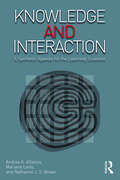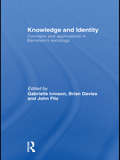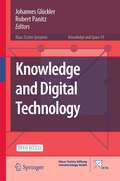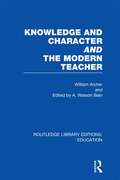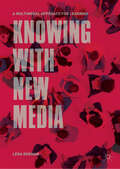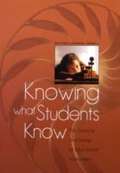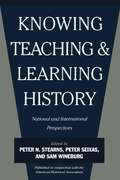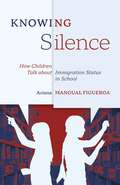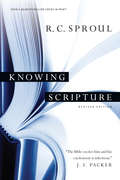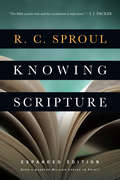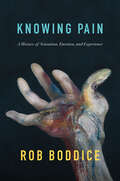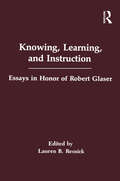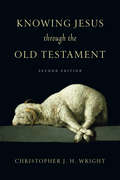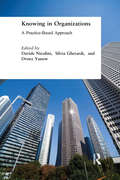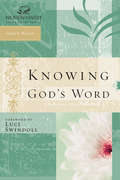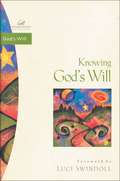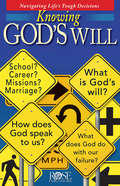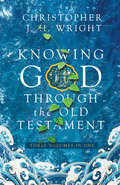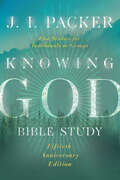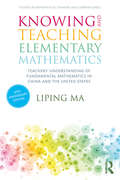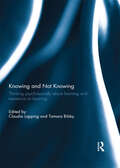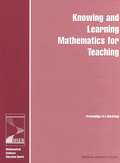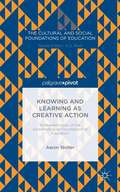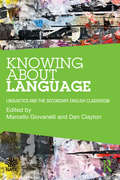- Table View
- List View
Knowledge and Interaction: A Synthetic Agenda for the Learning Sciences
by Andrea A. DiSessa Mariana Levin Nathaniel J.S. BrownDecades of research in the cognitive and learning sciences have led to a growing recognition of the incredibly multi-faceted nature of human knowing and learning. Up to now, this multifaceted nature has been visible mostly in distinct and often competing communities of researchers. From a purely scientific perspective, "siloed" science—where different traditions refuse to speak with one another, or merely ignore one another—is unacceptable. This ambitious volume attempts to kick-start a serious, new line of work that merges, or properly articulates, different traditions with their divergent historical, theoretical, and methodological commitments that, nonetheless, both focus on the highly detailed analysis of processes of knowing and learning as they unfold in interactional contexts in real time. Knowledge and Interaction puts two traditions in dialogue with one another: Knowledge Analysis (KA), which draws on intellectual roots in developmental psychology and cognitive modeling and focuses on the nature and form of individual knowledge systems, and Interaction Analysis (IA), which has been prominent in approaches that seek to understand and explain learning as a sequence of real-time moves by individuals as they interact with interlocutors, learning environments, and the world around them. The volume’s four-part organization opens up space for both substantive contributions on areas of conceptual and empirical work as well as opportunities for reflection, integration, and coordination.
Knowledge and Identity: Concepts and Applications in Bernstein's Sociology
by Gabrielle IvinsonWhat in the digital era is knowledge? Who has knowledge and whose knowledge has value? Postmodernism has introduced a relativist flavour into educational research such that big questions about the purposes of education have tended to be eclipsed by minutiae. Changes in economic and financial markets induce a sense that we are also experiencing an intellectual credit crunch. Societies can no longer afford to think about the role of education merely in relation to national markets and national citizenry. There is growing recognition that, once again, we need big thinking using big theoretical ideas in working on local problems of employability, sustainability and citizenship. Drawing on aspects of Bernstein’s work that have attracted an international following for many years, the international contributors to this book raise questions about knowledge production and subjectivity in times dominated by market forces, privatisation and new forms of state regulation. The book is divided into three sections: Part one extends Bernstein’s sociology of knowledge by revitalizing fundamental questions, such as: what is knowledge, how is it produced and what are its functions within education and society in late modernity? It demonstrates that big theory, like big science, provides immense resources for thinking ourselves out of crisis because, in contradistinction to micro theory, we are able to contemplate global transformations in ways which otherwise would remain unthinkable. Part two considers the new, hybrid forms of knowledge that are emerging in the gap opened up between economic markets and academic institutions across a range of countries. Bernstein said in the 1970s that schools cannot compensate for society but we might now ask: can universities compensate for the economy? Part three adds new conceptual tools to the understanding of subjectivity within Bernstein's sociology of knowledge and elaborates conceptual developments about pedagogic regulation, consciousness and embodiment. This book will appeal to sociologists, educationists and higher educators internationally and to students on sociology of education, curriculum and policy studies courses.
Knowledge and Digital Technology (Knowledge and Space #19)
by Johannes Glückler Robert PanitzThis open access book explores the multifaceted interplay of technology, knowledge, and place. While digital technology is increasingly influencing our way of knowing, conversely it is itself the consequence of human creativity and local social interaction. Part I analyzes how digital technologies transform markets through artificial intelligence and decentralized blockchain models. Its contributions discuss novel governance mechanisms, including the responsible use and analysis of big data. Part II illustrates various ways in which technology supports humanity, be it algorithms supporting complex decision-making processes or the use of robotics in care services. The chapters highlight that technology's efficiency and potential rely on social norms and human capital. Finally, Part III shows that digitization is generating vibrant entrepreneurship, reflected in geographically clustered urban scale-up economies, as well as opening up new ways for people to connect with one another, organize civic engagement and enable new forms of labor. The book offers theoretical reflections as well as empirical cases from the United States, Canada, Japan, South Africa, and Europe. This volume provides a valuable read for scholars, students and professionals in the fields of knowledge creation, technology and governance.
Knowledge And Curriculum
by A. TholappanKnowledge is habitually defined as a belief that is true and justified. On comparing knowledge and wisdom, knowledge is the accumulation of facts and information and wisdom is the synthesis is of knowledge and experiences into insights that deepen one’s understanding of relationships and the meaning of life.
Knowledge and Character bound with The Modern Teacher (Routledge Library Editions: Education)
by William ArcherWritten before, but published after The First World War, this volume’s plea for a national system of education which will produce a nation of prosperous, morally fulfilled people able to live at peace with other nations is doubly poignant given the sacrifice of the ‘lost generation’. However, the author also sees the horror of the War as an opportunity to change human destiny through education, an opportunity to abandon the narrow system of education in favour of one which will ‘bring education in touch with life’ and provide Britain with the intellectual and moral efficiency necessary to steer her through the following turbulent years of the twentieth century. Covering the core subjects of the English school curriculum in the early twentieth century the chapters in The Modern Teacher, if somewhat utopian, describe best practice in teaching of the particular subject and suggest possible improvements. One chapter also discusses the importance of the relatively new subject of citizenship, as well as the moral education of pupils.
Knowing with New Media: A Multimodal Approach for Learning
by Lena RedmanThis cutting edge book considers how advances in technologies and new media have transformed our perception of education, and focuses on the impact of the privatisation of digital tools as a mean of knowledge production. Arguing that education needs to adapt to the modern learner, the book’s unique approach is based on a disassociation with the deeply ingrained attitude with which people have traditionally viewed education – learning the existing symbolic systems of certain disciplines and then expressing themselves strictly within the operational modes of these systems. The ways of knowledge production – exploring, recording, representing, making meaning of and sharing human experiences – have been fundamentally transformed through the infusion of digital technologies into all aspects of human activity, allowing learners to engage with their immediate natural, social and cultural environments by capitalising on their individual abilities and interests. This book proposes a new approach to teaching and learning termed ‘cinematic bricolage’, which involves generating knowledge from heterogeneous resources in a ‘do-it-yourself’ manner while making meaning through multimodal representations. It shows how cinematic bricolage reconnects ways of knowing with ways of being, empowering the individual with a sense of personal identity and responsibility, helping to shape more aware social citizens.
Knowing what Students Know: The Science and Design of Educational Assessment
by National Research CouncilEducation is a hot topic. From the stage of presidential debates to tonight's dinner table, it is an issue that most Americans are deeply concerned about. While there are many strategies for improving the educational process, we need a way to find out what works and what doesn't work as well. Educational assessment seeks to determine just how well students are learning and is an integral part of our quest for improved education. The nation is pinning greater expectations on educational assessment than ever before. We look to these assessment tools when documenting whether students and institutions are truly meeting education goals. But we must stop and ask a crucial question: What kind of assessment is most effective? At a time when traditional testing is subject to increasing criticism, research suggests that new, exciting approaches to assessment may be on the horizon. Advances in the sciences of how people learn and how to measure such learning offer the hope of developing new kinds of assessments-assessments that help students succeed in school by making as clear as possible the nature of their accomplishments and the progress of their learning. Knowing What Students Know essentially explains how expanding knowledge in the scientific fields of human learning and educational measurement can form the foundations of an improved approach to assessment. These advances suggest ways that the targets of assessment-what students know and how well they know it-as well as the methods used to make inferences about student learning can be made more valid and instructionally useful. Principles for designing and using these new kinds of assessments are presented, and examples are used to illustrate the principles. Implications for policy, practice, and research are also explored. With the promise of a productive research-based approach to assessment of student learning, Knowing What Students Know will be important to education administrators, assessment designers, teachers and teacher educators, and education advocates.
Knowing, Teaching, and Learning History: National and International Perspectives
by Peter N. Stearns Peter Seixas Sam WineburgOn January 18,1995, the "History Wars," to that point confined largely to skirmishes on op-ed pages of the New York Times and Washington Post, erupted on the floors of the United States Congress.
Knowing Silence: How Children Talk about Immigration Status in School
by Ariana Mangual FigueroaLearning from children about citizenship status and how it shapes their schooling There is a persistent assumption in the field of education that children are largely unaware of their immigration status and its implications. In Knowing Silence, Ariana Mangual Figueroa challenges this &“myth of ignorance.&” By listening carefully to both the speech and significant silences of six Latina students from mixed-immigration-status families, from elementary school into middle school and beyond, she reveals the complex ways young people understand and negotiate immigration status and its impact on their lives. Providing these children with iPod Touches to record their own conversations, Mangual Figueroa observes when and how they choose to talk about citizenship at home, at school, and in public spaces. Analyzing family conversations about school forms, in-class writing assignments, encounters with the police, and applications for college, she demonstrates that children grapple with the realities of citizenship from an early age. Educators who underestimate children&’s knowledge, Mangual Figueroa shows, can marginalize or misunderstand these students and their families. Combining significant empirical findings with reflections on the ethical questions surrounding research and responsibility, Mangual Figueroa models new ways scholars might collaborate with educators, children, and families. With rigorous and innovative ethnographic methodologies, Knowing Silence makes audible the experiences of immigrant-origin students in their own terms, ultimately offering teachers and researchers a crucial framework for understanding citizenship in the contemporary classroom.
Knowing Scripture (Flet Ser.)
by R. C. SproulKnowing Scripture,readstudydiscovering the meanings of biblical wordsunderstanding Hebrew poetry, proverbs and parablesapproaching historical and didactic passagesbeing careful with predictive prophecydiscerning how culture conditions the Biblechoosing and using Bible translations, commentaries, Bible software and other helpsKnowing Scripture
Knowing Scripture
by R. C. Sprouldiscovering the meanings of biblical wordsunderstanding Hebrew poetry, proverbs and parablesapproaching historical and didactic passagesbeing careful with predictive prophecydiscerning how culture conditions the Biblechoosing and using Bible translations, commentaries, Bible software and other helps
Knowing Pain: A History of Sensation, Emotion, and Experience
by Rob BoddicePain, while known to almost everyone, is not universal. The evidence of our own pain, and our own experience, does not provide us with automatic insight into the pains of others, past or present. No matter how self-evident and ubiquitous the sting of a paper cut or the desolation of heartbreak might seem, pain is situated and historically specific. In a work that is sometimes personal, always political, Rob Boddice reveals a history of pain that juggles many disciplinary approaches and disparate languages to tackle the thorniest challenges in pain research. He explores the shifting meaning-making processes that produce painful experiences, expanding the world of pain to take seriously the relationship between pain’s physicality and social and emotional suffering. Ranging from antiquity to the present and taking in pain knowledge and pain experiences from around the world, his tale encompasses not only injury, but also grief, exclusion, chronic pain, and trauma, and reveals how knowledge claims about pain occupy what pain is like. Innovative and compassionate in equal measure, Knowing Pain puts forward an original pain agenda that is essential reading for those interested in the history of emotions, senses, and experience, for medical researchers and practitioners, and for anyone who has known pain.
Knowing, Learning, and instruction: Essays in Honor of Robert Glaser (Psychology of Education and Instruction Series)
by Lauren B. ResnickCelebrating the 20th anniversary of the Learning Research and Development Center (LRDC) at the University of Pittsburgh, these papers present the most current and innovative research on cognition and instruction. Knowing, Learning, and Instruction pays homage to Robert Glaser, founder of the LRDC, and includes debates and discussions about issues of fundamental importance to the cognitive science of instruction.
Knowing Jesus Through the Old Testament (Knowing God Through the Old Testament Set)
by Christopher J. WrightWe cannot know Jesus without knowing his story. Today the debate over who Jesus is rages on. Has the Bible bound Christians to a narrow and mistaken notion of Jesus? Should we listen to other gospels, other sayings of Jesus, that enlarge and correct a mistaken story? Is the real Jesus entangled in a web of the church's Scripture, awaiting liberation from our childhood faith so he might speak to our contemporary pluralistic world? To answer these questions we need to know what story Jesus claimed for himself. Christopher Wright is convinced that Jesus' own story is rooted in the story of Israel. In this revised and updated book he traces the life of Christ as it is illuminated by the Old Testament. And he describes God's design for Israel as it is fulfilled in the story of Jesus.
Knowing in Organizations: A Practice-Based Approach
by Davide NicoliniThis work explores the relationship among knowing, learning, and practice in the development of organizational knowledge. It explores the implications for intervention growing out of the notion that organizational knowledge cannot be conceived as a mental process residing in members' heads.
Knowing God's Word: Women of Faith Study Guide Series (Women of Faith Study Guide Series)
by Women Of FaithMany women find reading the Scriptures to be a daunting prospect, let alone actually studying them. Questions arise. Is studying the Bible different from reading it? Why do we study God's Word? How do you study God's Word? Knowing God's Word will prepare women to approach the Bible with confidence and excitement.Reaching an audience across racial, socio-economic, denominational, and age boundaries, these guides will enhance the lives of women as they empower them in their weekly devotions. The study guides can be used for both individual and group settings. Women are asking good questions about their faith. With our study guides, we want to join them in their quest for knowledge and lead them in finding the answers they are seeking.
Knowing God's Will
by Evelyn Bence Luci SwindollThe Women of Faith Bible Study Series helps you turn the laughter and lessons of Women of Faith conferences into a journey of growth shared by special friends. Whether of not you've attended a conference, you will appreciate the bonds that form as you join with other women linked together in friendship, prayer, joy, and faith. Each study will also lead you to a deeper love of the Bible and a greater appreciation of the power of God's Word. Each session includes six sections: - A Moment for Quiet Reflection - Just for Fun - Knowing God's Heart - Praying Together - Friendship Boosters - Making It Real in Your Own Life - The leader's guide that's included makes it easy to facilitate weekly Bible studies that will nurture your knowledge of Scripture and your sense of God's presence in your life.
Knowing God's Will
by Rose PublishingThe Twelve Disciples - The Life and Ministry of Jesus' 12 Disciples
Knowing God Through the Old Testament: Three Volumes in One (Knowing God Through The Old Testament Set Ser.)
by Christopher J.H. WrightCombining three volumes into one, Knowing God Through the Old Testament brings together three of Christopher J. H. Wright's best loved books: Knowing God the Father Through the Old Testament, Knowing Jesus Through the Old Testament, and Knowing the Holy Spirit Through the Old Testament. Knowing God the Father Through the Old Testament explores images that pervade the biblical narratives, psalms, and prophetic texts of the Old Testament. God is acknowledged as tender yet terrifying, challenging to the nations, and yet intimately personal, offering loving care, provision, discipline, and forgiveness. This is the God whom Jesus knew, and whom we can know, as Father. Knowing Jesus Through the Old Testament uncovers Jesus' self-understanding as Son of Man and Son of God from his deep roots in the Hebrew Scriptures. As the Jesus who fulfilled the mission that God had given to Israel is revealed, we discover that the more we understand the Old Testament, the closer we come to the heart of Jesus. Knowing the Holy Spirit Through the Old Testament traces the Holy Spirit through the pages of the Old Testament. We see the Third Person of the Trinity in the decrees of prophets and psalmists, in the actions of judges and craftspeople, in the anointing of kings, and the promise of a new creation. The witness of the whole of Scripture directs us to a Holy Spirit empowering the people of God, and sustaining and renewing the face of the earth. This three-volume work will strengthen and deepen readers' personal relationships with the triune God by enabling them to know him through deep immersion and engagement with his Word, especially in the less familiar voices of the Old Testament. This is a voyage of biblical discovery, crossing many horizons and exploring especially the sources of our knowledge of God the Holy Trinity—Father, Son and Holy Spirit.
Knowing God Bible Study (The\ivp Signature Collection)
by J. I. PackerFaithful. Triune. Beyond comparison. Triumphant over all. These words barely begin to describe the God we serve, yet he invites us to have a relationship with him. What could be more important than knowing this all-surpassing God? These five easy-to-use Bible studies, based on J. I. Packer's bestselling classic Knowing God, explore the character and actions of God throughout Scripture. They encourage us to look for God every time we read the Bible and to deepen our understanding, trust, and worship in response. In honor of the fiftieth anniversary of Knowing God, this edition of the Knowing God Bible Study helps individuals and groups explore and apply biblical truths. Each session features an insightful quotation by Packer matched with a Scripture passage, reflection questions, and application ideas that will equip readers to gain a fuller knowledge of the God we worship. A leader's guide and list of suggested resources are also included. Also available: Knowing God Devotional Journal, Knowing God Study Guide, and Knowing God Fiftieth Anniversary Edition.
Knowing and Teaching Elementary Mathematics: Teachers' Understanding of Fundamental Mathematics in China and the United States (Studies in Mathematical Thinking and Learning Series)
by Liping MaThe 20th anniversary edition of this groundbreaking and bestselling volume offers powerful examples of the mathematics that can develop the thinking of elementary school children. Studies of teachers in the U.S. often document insufficient subject matter knowledge in mathematics. Yet, these studies give few examples of the knowledge teachers need to support teaching, particularly the kind of teaching demanded by reforms in mathematics education. Knowing and Teaching Elementary Mathematics describes the nature and development of the knowledge that elementary teachers need to become accomplished mathematics teachers, and suggests why such knowledge seems more common in China than in the United States, despite the fact that Chinese teachers have less formal education than their U.S. counterparts. Along with the original studies of U.S. and Chinese teachers’ mathematical understanding, this 20th anniversary edition includes a new preface and a 2013 journal article by Ma, "A Critique of the Structure of U.S. Elementary School Mathematics" that describe differences in U.S. and Chinese elementary mathematics. These are augmented by a new series editor’s introduction and two key journal articles that frame and contextualize this seminal work.
Knowing and Not Knowing: Thinking psychosocially about learning and resistance to learning
by Claudia Lapping and Tamara BibbyThe social world is saturated with powerful formations of knowledge that colonise individual and institutional identities. Some knowledge emerges as legitimised and authoritative; other knowledge is resisted or repressed. Psychosocial approaches highlight the unstable basis of knowledge, learning and research; of knowing and not knowing. How do we come to formulate knowledge in the ways that we do? Are there other possible ways of knowing that are too difficult or unsettling for us to begin to explore? Do we need the authority of legitimised institutions and regularized methods to build secure knowledge? What might it mean to build insecure edifices of knowledge? How might we trouble notions of knowledge in processes of teaching, learning and research?This collection addresses these questions, drawing on a range of psychoanalytic and social theory, from Bion, Freud and Lacan, to Derrida, Kristeva and Zizek. Showcasing work from North America, Europe and Japan, contributors explore writing as a practice that can stabilise or unsettle subjectivities; the unconscious relations between school practices, subjectivities, educational spaces and ideologies; implications of the productive energies and the deadening inwardness associated with mourning and melancholia for formal and informal learning; and the authority we invest in apparently rigid or ephemeral institutional spaces. Strongly empirical as well as theoretical in approach, this collection will be of interest to students and academics seeking ways to resist normative orders of legitimacy and coherence in education and research. This book was originally published as a special issue of Pedagogy, Culture & Society.
Knowing and Learning Mathematics for Teaching
by Mathematics Teacher Preparation Content Workshop Program Steering CommitteeThere are many questions about the mathematical preparation teachers need. Recent recommendations from a variety of sources state that reforming teacher preparation in postsecondary institutions is central in providing quality mathematics education to all students. The Mathematics Teacher Preparation Content Workshop examined this problem by considering two central questions: What is the mathematical knowledge teachers need to know in order to teach well? How can teachers develop the mathematical knowledge they need to teach well? The Workshop activities focused on using actual acts of teaching such as examining student work, designing tasks, or posing questions, as a medium for teacher learning. The Workshop proceedings, Knowing and Learning Mathematics for Teaching, is a collection of the papers presented, the activities, and plenary sessions that took place.
Knowing and Learning as Creative Action: A Reexamination of the Epistemological Foundations of Education
by Aaron StollerStoller challenges the long-held view that knowing is a causal and linear act, arguing instead that the process of knowing is interdependent, transactional, and grounded in creative action.
Knowing About Language: Linguistics and the secondary English classroom (National Association for the Teaching of English (NATE))
by Dan Clayton Marcello GiovanelliKnowing About Language is an essential and comprehensive introduction to and discussion of the value of linguistics in the secondary and post 16 curriculum. Split into three easily accessible parts, each chapter draws on theoretical and practical reasons for developing language awareness for the teacher and student, the impact of government and institutional policy on teaching and teacher knowledge, and explores recent research about the value of linguistic knowledge to support student attainment. Expert contributors show how recent innovations in linguistics can support language teaching by providing a range of practical ideas that can be used in the classroom. Knowing About Language is a valuable theoretical, critical and practical guide for the teacher and researcher, and anyone interested in applied linguistics and the study of language in education.Written by authors who are passionate about the value of language study both as a classroom topic and more generally, this book acts as a resource to inform and support teachers in wider aspects of their role by demonstrating the powerfully enabling nature and inherent value of language study and linguistics in secondary and post-16 curricula.
